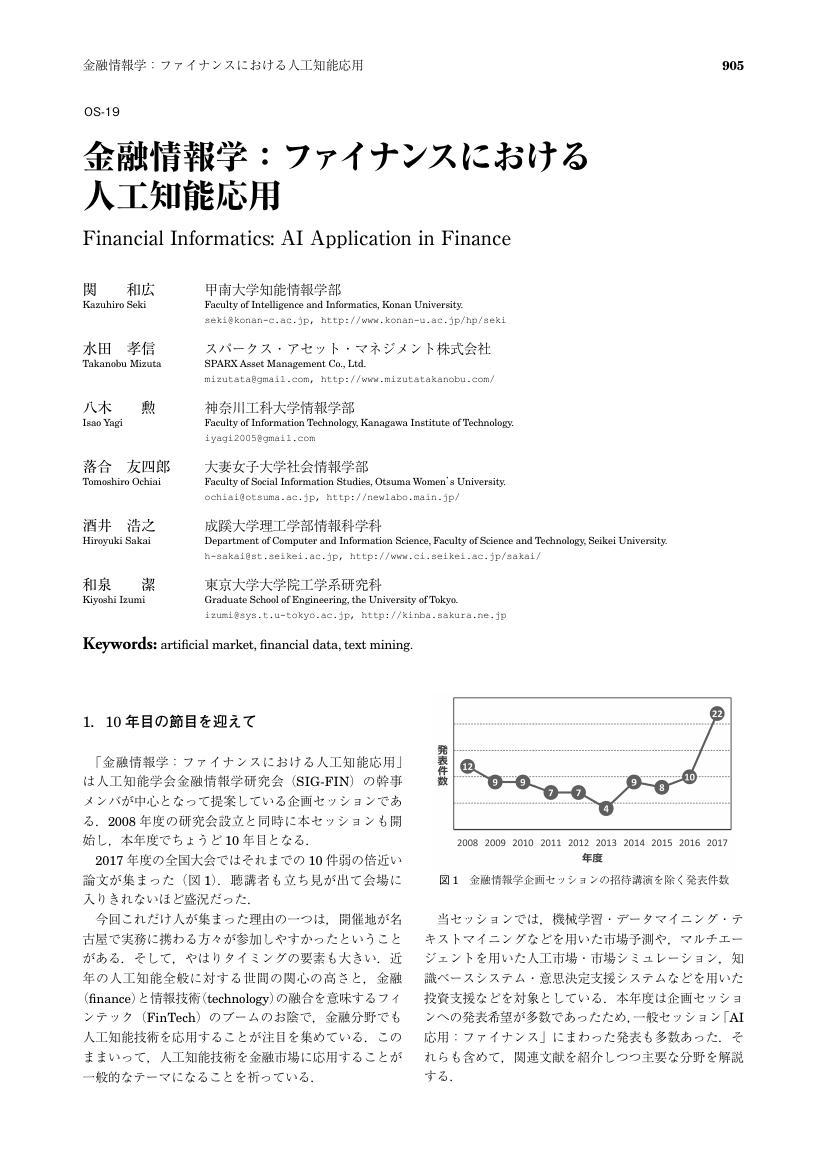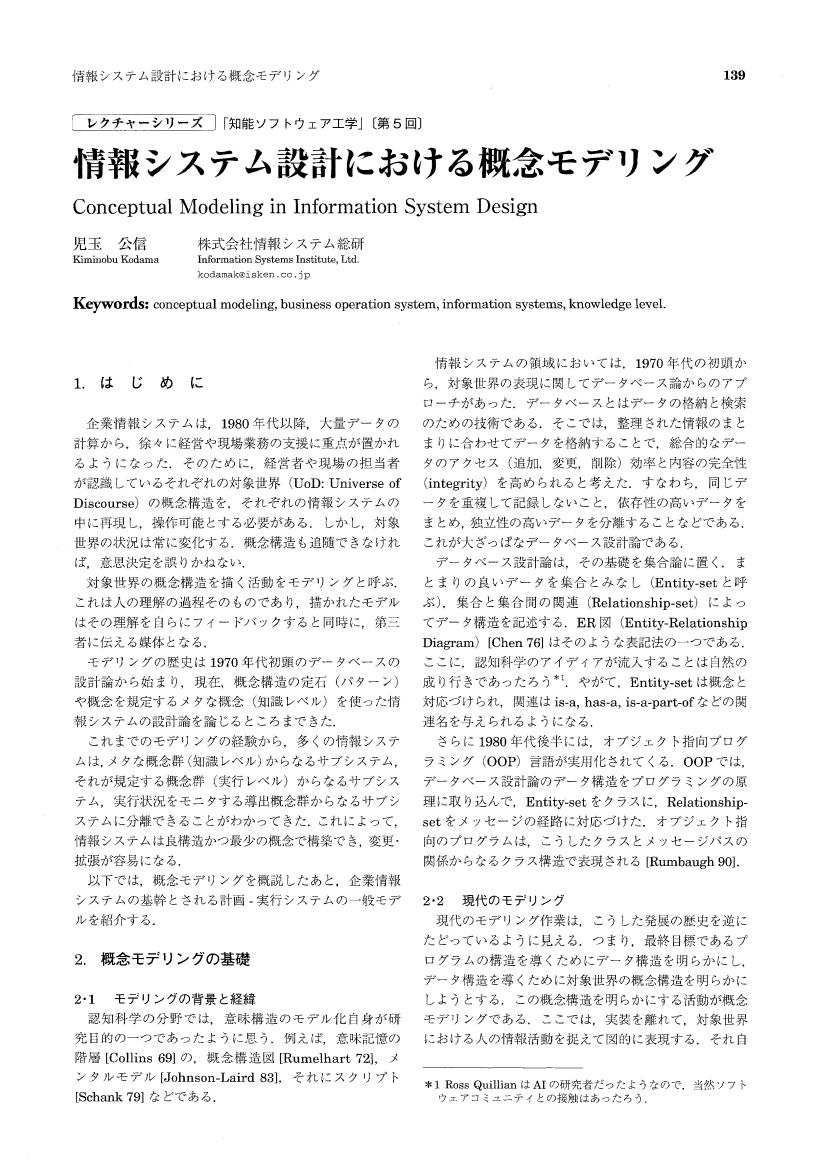2 0 0 0 VR 研究の軌跡と未来展望
- 著者
- Mel Slater 板谷 玲哉
- 出版者
- 一般社団法人 人工知能学会
- 雑誌
- 人工知能 (ISSN:21882266)
- 巻号頁・発行日
- vol.38, no.4, pp.449-453, 2023-07-01 (Released:2023-07-01)
2 0 0 0 OA Twitterにおける情報伝播(<特集>Twitterとソーシャルメディア)
- 著者
- 風間 一洋
- 出版者
- 一般社団法人 人工知能学会
- 雑誌
- 人工知能 (ISSN:21882266)
- 巻号頁・発行日
- vol.27, no.1, pp.35-42, 2012-01-01 (Released:2020-09-29)
- 被引用文献数
- 1
- 著者
- 黒田 航
- 出版者
- 一般社団法人 人工知能学会
- 雑誌
- 人工知能 (ISSN:21882266)
- 巻号頁・発行日
- vol.27, no.3, pp.326-332, 2012-05-01 (Released:2020-09-29)
- 著者
- 児玉 謙太郎 村上 久 阿部 廣二
- 出版者
- 一般社団法人 人工知能学会
- 雑誌
- 人工知能 (ISSN:21882266)
- 巻号頁・発行日
- vol.37, no.6, pp.690-692, 2022-11-01 (Released:2022-11-01)
2 0 0 0 OA 間合いと身体知
- 著者
- 諏訪 正樹 坂井田 瑠衣 伝 康晴
- 出版者
- 一般社団法人 人工知能学会
- 雑誌
- 人工知能 (ISSN:21882266)
- 巻号頁・発行日
- vol.32, no.2, pp.255-262, 2017-03-01 (Released:2020-09-29)
2 0 0 0 OA 統計的アブダクション(<特集>論理に基づく推論研究の動向)
- 著者
- 佐藤 泰介
- 出版者
- 一般社団法人 人工知能学会
- 雑誌
- 人工知能 (ISSN:21882266)
- 巻号頁・発行日
- vol.25, no.3, pp.400-407, 2010-05-01 (Released:2020-09-29)
2 0 0 0 OA 「金融情報学:ファイナンスにおける人工知能応用」
- 著者
- 関 和広 水田 孝信 八木 勲 落合 友四郎 酒井 浩之 和泉 潔
- 出版者
- 一般社団法人 人工知能学会
- 雑誌
- 人工知能 (ISSN:21882266)
- 巻号頁・発行日
- vol.32, no.6, pp.905-910, 2017-11-01 (Released:2020-09-29)
2 0 0 0 OA 学生フォーラム〔第 116 回〕葛岡英明先生インタビュー「デュアル思考で行く先を広げる」
- 著者
- 柏倉 沙耶 近藤 千紗
- 出版者
- 一般社団法人 人工知能学会
- 雑誌
- 人工知能 (ISSN:21882266)
- 巻号頁・発行日
- vol.38, no.2, pp.289-292, 2023-03-01 (Released:2023-03-02)
2 0 0 0 OA 私のブックマーク:反実仮想機械学習
- 著者
- 齋藤 優太
- 出版者
- 一般社団法人 人工知能学会
- 雑誌
- 人工知能 (ISSN:21882266)
- 巻号頁・発行日
- vol.35, no.4, pp.579-587, 2020-07-01 (Released:2020-09-29)
2 0 0 0 OA 社会的規範の維持と変化を説明する:進化社会科学における未解決の問い
- 著者
- 竹澤 正哲
- 出版者
- 一般社団法人 人工知能学会
- 雑誌
- 人工知能 (ISSN:21882266)
- 巻号頁・発行日
- vol.34, no.2, pp.168-175, 2019-03-01 (Released:2020-09-29)
2 0 0 0 OA 特集:「災害情報と AI」特集「災害情報と AI」にあたって
- 著者
- 池田 圭佑 谷 真宏
- 出版者
- 一般社団法人 人工知能学会
- 雑誌
- 人工知能 (ISSN:21882266)
- 巻号頁・発行日
- vol.38, no.1, pp.2-3, 2023-01-01 (Released:2023-01-01)
- 著者
- 小林 靖明 伏見 卓恭
- 出版者
- 一般社団法人 人工知能学会
- 雑誌
- 人工知能 (ISSN:21882266)
- 巻号頁・発行日
- vol.38, no.1, pp.45, 2023-01-01 (Released:2023-01-01)
- 著者
- 三宅 陽一郎
- 出版者
- 一般社団法人 人工知能学会
- 雑誌
- 人工知能 (ISSN:21882266)
- 巻号頁・発行日
- vol.37, no.6, pp.860-873, 2022-11-01 (Released:2022-11-01)
- 著者
- 松原 仁 滝沢 武信
- 出版者
- 一般社団法人 人工知能学会
- 雑誌
- 人工知能 (ISSN:21882266)
- 巻号頁・発行日
- vol.16, no.3, pp.379-384, 2001-05-01 (Released:2020-09-29)
2 0 0 0 OA ミンスキーの死を悼む
- 著者
- 松原 仁
- 出版者
- 一般社団法人 人工知能学会
- 雑誌
- 人工知能 (ISSN:21882266)
- 巻号頁・発行日
- vol.31, no.3, pp.433-434, 2016-05-01 (Released:2020-09-29)
- 著者
- 田和辻 可昌 梶野 洸
- 出版者
- 一般社団法人 人工知能学会
- 雑誌
- 人工知能 (ISSN:21882266)
- 巻号頁・発行日
- vol.37, no.6, pp.884, 2022-11-01 (Released:2022-11-01)
2 0 0 0 OA グローバルアイ〔第61 回〕台湾で働いてはいけない
- 著者
- 福島 宙輝
- 出版者
- 一般社団法人 人工知能学会
- 雑誌
- 人工知能 (ISSN:21882266)
- 巻号頁・発行日
- vol.37, no.6, pp.874-876, 2022-11-01 (Released:2022-11-01)
2 0 0 0 OA SFとAIとガンダム(<特集>SFとAI)
- 著者
- 林 譲治
- 出版者
- 一般社団法人 人工知能学会
- 雑誌
- 人工知能 (ISSN:21882266)
- 巻号頁・発行日
- vol.29, no.5, pp.547-549, 2014-09-01 (Released:2020-09-29)
2 0 0 0 OA 遺伝的アルゴリズムにおける世代交代モデルの提案と評価
- 著者
- 佐藤 浩 小野 功 小林 重信
- 出版者
- 一般社団法人 人工知能学会
- 雑誌
- 人工知能 (ISSN:21882266)
- 巻号頁・発行日
- vol.12, no.5, pp.734-744, 1997-09-01 (Released:2020-09-29)
- 被引用文献数
- 5
When Genetic Algorithms (GAs) are applied to optimization problems, characteristic preserving in designing coding/crossover and diversity maintaining in designing generation alternation are important. Generation alternation models are independent of problems, while coding/crossover depends on problems. We discuss generation alternation models in this paper. Simple GA is one of the well-known generation alternation models, however it has two problems. One is early convergence in the first stage of search and the other is evolutionary stagnation in the last stage of it. Many improvements and new models have been presented to overcome the above problems. In this paper, we propose a new generation alternation model called minimal generation gap (MGG) which has all advantages of conventional models. As generation alternation models use only information of fitness, alternation of generations can be regarded as a transformation of fitness distributions. We propose a new method of assessing generation alternation models. We measure the ability of avoiding the early convergence and suppressing the evolutionary stagnation by the dynamics of the best value and variance of fitness distributions. From the results of some experiments, we found that MGG is the most desirable model which can avoid the early convergence and suppress the evolutionary stagnation. We also show the efficiency of MGG by applying it to benchmarks in different two domains: function optimization and traveling salesman problems. In the both domains, MGG showed higher performance than the other conventional models especially under small population size.
- 著者
- 児玉 公信
- 出版者
- 一般社団法人 人工知能学会
- 雑誌
- 人工知能 (ISSN:21882266)
- 巻号頁・発行日
- vol.25, no.1, pp.139-146, 2010-01-01 (Released:2020-09-29)











